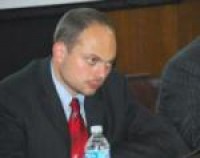MOSCOW, RUSSIA—The biggest winners in Sunday’s election for the Russian State Duma were despair and apathy. The years of manipulated elections and overwhelming government control over politics and media under Vladimir Putin have convinced most Russians that voting is meaningless. The turnout on September 18 was the lowest on record: the official (and likely inflated) figure was 48 percent, with the turnout in Moscow and St. Petersburg—the most politically active parts of the country—at a dismal 35 and 33 percent, respectively.
On the one hand, the results of Sunday’s vote put to rest the myth of “90 percent support” for Putin: even according to the official results, the ruling United Russia party received 54 percent of the vote on a 48 percent turnout. But mass abstention also hurt opposition candidates, who were allowed on the ballot as part of the regime’s efforts to render the vote some legitimacy and avoid a repeat of mass protests that followed the blatantly rigged election in 2011. No party except United Russia and the three Kremlin-controlled “opposition” groups made it past the five-percent threshold required to enter the Duma. In single-member districts, reinstated in response to the 2011 protests, opposition candidates fared better, but still won no seats. The young democratic activists supported by Mikhail Khodorkovsky’s Open Russia movement polled on average 4 percent of the vote, with those in Moscow and St. Petersburg at 8 percent. “Our candidates managed to attract more than 100,000 votes and to compel the electoral commissions to reflect these in their final reports,” Khodorkovsky observed. “I believe that this is a worthy result for new political names and a good indication of future possibilities.”
Advertisement / Reklaam
Advertisement / Reklaam
The biggest disappointment to opposition supporters came in Moscow’s Tushinsky district, where Dmitri Gudkov—the only independent legislator in the outgoing State Duma—came just six percent short of victory. In the face of persistent attacks by state television, Gudkov ran a vigorous grassroots campaign, holding more than 250 face-to-face meetings with voters in his district—and won 20 percent of the vote, to 26 percent for United Russia candidate Gennady Onishchenko, Russia’s former chief sanitary inspector best known for his warnings that attending opposition rallies carries a high risk of respiratory infections, and his assertion that pigs are closest to humans in the line of evolution. With Gudkov out, the new Duma will be totally opposition-free.Still, there were some small pockets of hope in the overall gloom—all of them in Russia’s northwest, a traditional democratic support base. Yabloko, a liberal party that opposes both the domestic and foreign policies of Putin’s Kremlin (including the war on Ukraine and the annexation of Crimea,) returned to the legislative assemblies in St. Petersburg, Karelia, and the Pskov region. In Pskov, Lev Shlosberg, a crusading opposition leader, won back the seat from which he was expelled last year by the assembly’s United Russia majority.
The Kremlin has won, for now. But the fact that most Russians now believe that change cannot be achieved through the ballot box is not a promising sign for those in power. Sooner or later, change will come—because of mounting economic troubles, the regime’s new foreign policy adventures, or sheer fatigue with a leader who has been in power for a generation. “There are only two kinds of dialogue with the government—in elections or on the barricades,” Khodorkovsky noted. “These are the two choices facing true patriots and citizens of Russia.” When the first option stops working, people inevitably start to think about the second.

























